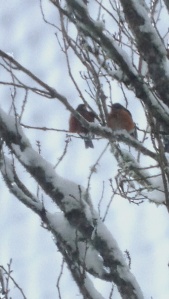By now you should know how to write 马 (mǎ horses) with your eyes closed. Beware, though, that there are a few other characters that look somewhat similar. For example, 与 (yǔ and) is a conjunctive that is used in much the same way as 和 (hé and). 鸟 (niǎo) are birds. 乌 (wū) means dark or black, and 乌鸦 (wūyā) are crows.
There is a popular story from Aesop’s Fables with the title “The Fox and the Crow”. In Chinese, it is called 狐狸和乌鸦 (Húli Hé Wūyā) or 狐狸与乌鸦 (Húli Yǔ Wūyā). In the story the crow lost a piece of meat that she had found after a long search, all because she fell for the fox’s flattery.
阿谀 (ēyú) and 奉承 (fèngcheng) both mean flattery. You can also use them as verbs. Informally, people use the expression 拍马屁 (pāimǎpì) to describe the action of flattering or fawning on someone. 拍 (pāi) is to pat, to clap or to bat. 屁股 (pìgu) is an informal word for buttocks. When talking with people outside your family, use the word 臀部 (túnbù buttocks) instead. 马屁 (mǎ pì) is short for 马屁股 (mǎ pìgu horse’s rump). So, patting the haunch of someone’s horse and praising the horse (no matter if the horse is worthy of the praise) is tantamount to flattering the owner. Although the term 拍马屁 (pāimǎpì) is used among friends, as a rule of thumb it’s best to avoid saying in public words that contain 屁 (pì intestinal gas). This shouldn’t be difficult to remember as it sounds exactly the same as the English word pee.
他升得快是因为他懂得怎么拍马屁.
Tā shēng de kuà shì yīnwei tā dǒngde zěnme pāimǎpì.
He gets promotions because he knows how to flatter (the boss.)
At this link is “The Fox and the Crow” retold in Chinese. The narrative is delivered at an easy pace. You should be able to follow it with the help of the following word list.
山坡 (shānpō) means hillside.
树枝 (shùzhī) are branches of a tree.
窝 (wō) is a nest, a pit for shelter, or a brood or litter of animals.
并且 (bìngqiě) means moreover or furthermore.
孵 (fū) is to hatch or incubate.
洞 (dòng) is a hole or a cavity.
好不容易 (hǎo bù róngyì) means with much effort.
找到 (zhǎodào) is to have found something.
肉 (ròu) means meat, flesh, or pulp of fruits.
叼 (diāo) is to hold and carry in the mouth.
足够 (zúgòu) means sufficient.
这时候 (zhè shíhòu) means at this moment or at this time.
肚子饿 (dùzi è) is to be hungry.
抬头 (táitóu) is to raise one’s heas and look up.
香 (xiāng) means fragrant or tasty.
馋 (chán) means gluttonous.
流口水 (liú kǒushuǐ) is to salivate.
鬼主意 (guǐzhǔyì) is a wicked idea or scheme.
邻居 (línjū) are neighbors.
尊贵 (zūnguì) means honorable or respected.
作声 (zuò shēng) is to make a sound or utter words.
胖 (pàng) means chubby.
仍然 (réngrán) is an adverb that means “still”.
羽毛 (yǔmáo) are feathers.
可怜的 (kělián) means pitiable.
麻雀 (máquè) is a sparrow.
比 (bǐ) is to compare.
差 (chā) means difference or being inferior.
再说 (zàishuō) here means “What’s more …”.
嗓子 (sǎngzi) refers to the voice box (larynx).
唱歌 (chànggē) is to sing.
欣赏 (xīnshǎng) means to enjoy or appreciate.
得意 (déyì) means to be proud of oneself.
痒 (yǎng) means itchy or itching.
忍不住 (rěnbuzhù) means unable to hold back, or cannot help but do something.
掉到地上 (diào dào dì shàng) is for something to fall onto the ground.



Recent Comments